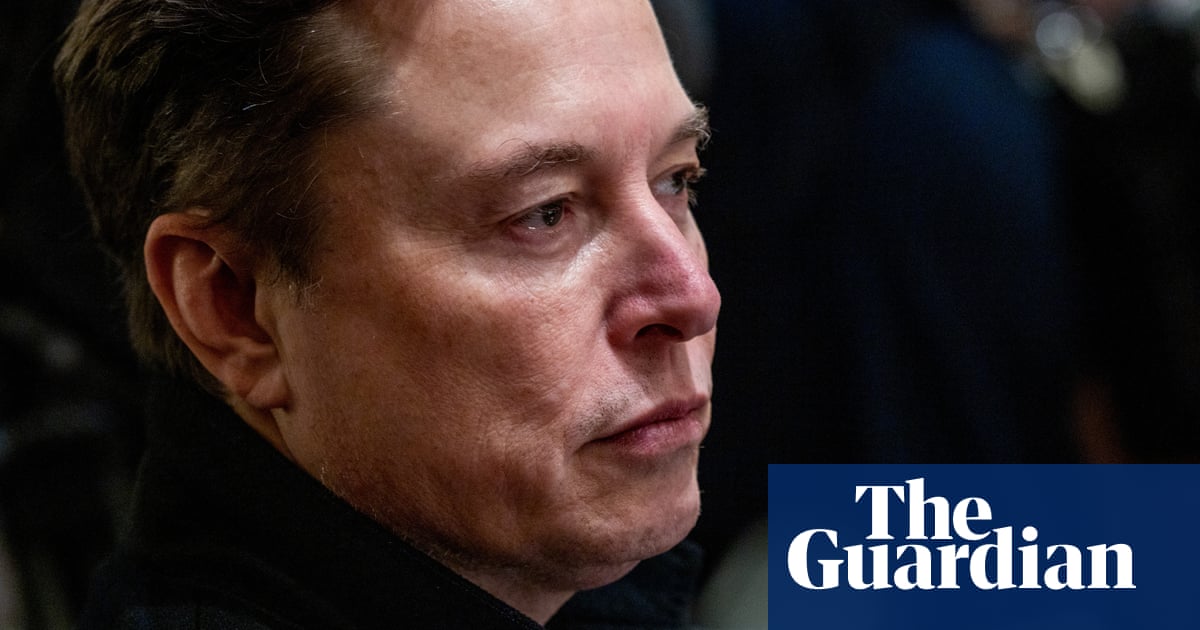Elon Muskand his companies face at least $2.37bn in legal exposure from federal investigations, litigation and regulatory oversight, according to a new report from SenateDemocrats. The report attempts to put a number to Musk’s many conflicts of interest through his work with his so-called “department of government efficiency” (Doge), warning that he may seek to use his influence to avoid legal liability.
The report, which waspublished on Mondayby Democratic members of the Senate homeland security committee’s permanent subcommittee on investigations, looked at 65 actual or potential actions against Musk across 11 separate agencies. Investigators calculated the financial liabilities Musk and his companies, such as Tesla, SpaceX and Neuralink, may face in 45 of those actions.
Since Donald Trump won re-election last year and Musk took on the role of de facto head ofDogein January, ethics watchdogs and Democratic officials have warned that the Tesla CEO could use his power to oust regulators and quash investigations into his companies. In the role, Musk, the richest man in the world, holds sway over agencies that regulate or contract with his companies. The subcommittee report outlines the extent of Musk’s liabilities, which include potentially facing $1.19bn in fines to Tesla alone over allegations it made false or misleading statements about its autopilot and self-driving features.
Although the report gives a total estimated amount, it also states that the $2bn-plus figure does not include how much Musk could avoid from investigations that the Trump administration declines to launch. It also excludes the potential contracts, such ascommunications dealswith his Starlink satellite internet service, that Musk’s companies could gain because of his role in the administration.
“While the $2.37 billion figure represents a credible, conservative estimate, it drastically understates the true benefit Mr Musk may gain from legal risk avoidance alone as a result of his position in government,” the report states.
TheTrump administrationhas downplayed concerns over Musk’s conflicts of interest in recent months, with the White House press secretary, Karoline Leavitt, stating in early February that he would “excuse himself” if there was any issue. Democrats havepressed the administration for answerson how Musk is addressing these conflicts, while also seeking to put theincreasingly unpopular billionaireat the forefront of their attacks against the Trump administration. The Democratic senator Jeanne Shaheen introduced a bill earlier this month targeting Musk that would prohibit awarding government contracts to companies owned by special government employees.
“Despite numerous requests from members of Congress, the Trump Administration has failed to provide any relevant documents or information, the authorities relied upon for these actions, or an explanation of how Mr Musk is navigating the conflicts they inherently pose,” the report states.
Musk’s conflicts span multiple agencies, including the Federal Aviation Administration (FAA) which oversees SpaceX rocket launches and the National Highway Traffic Safety Administration (NHTSA), which has multiple open investigations into Tesla’s operations. In February, Dogefired workersat the NHTSA that were experts in self-driving car technology.
Sign up toTechScape
A weekly dive in to how technology is shaping our lives
after newsletter promotion
The permanent subcommittee on investigations is a bipartisan subcommittee with a Republican majority and Democratic minority, the latter of which is chaired by Connecticut senator Richard Blumenthal. The subcommittee’s report issues a series of demands to Trump, executive departments and regulatory agencies to take stronger oversight action against Musk, including allowing for independent audits of major contracts given to Musk-affiliated companies.
“No one individual, no matter how prominent or wealthy, is above the law,” the report states in its conclusion. “Anything less than decisive, immediate, and collective action risks America becoming a bystander to the surrender to modern oligarchy.”
